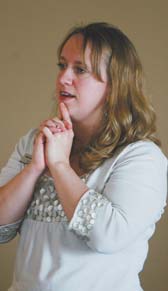Greenford forum focuses on ministering to dementia patients

Jennifer Miller, education coordinator of Greater East Ohio Area Chapter of the Alzheimer’s Association, questions participants at a program Tuesday at Greenford Christian Church on solutions to everyday problems encountered by Alzheimer’s patients.
By LINDA M. LINONIS
GREENFORD
Those who minister to the spiritual lives of Alzheimer’s disease patients need the proverbial patience of Job supported by practical methods.
During a “Ministering to Spiritual Needs in the World of Dementia” program Tuesday at Greenford Christian Church, 11767 Lisbon Road, about 35 people in faith-related positions got insight into Alzheimer’s disease and skills to interact with those afflicted by it. Theresa Depp, family service coordinator, and Jennifer Miller, education coordinator, of the Greater East Ohio Area Chapter of the Alzheimer’s Association were presenters.
Depp and Miller provided facts about the disease and how it undermines the thought process, impairs memory and changes behavior. They also discussed community services available to Alzheimer’s patients and their families. Armed with this information, participants were better equipped to understand and support families who have a member with Alzheimer’s, how to help and counsel caregivers and how to minister to spiritual needs of people with dementia.
Miller suggested these methods to the clergy, chaplains and ministry leaders when ministering to dementia patients:
Approach from the front because changes in sight often affect peripheral vision.
Always introduce yourself.
Be patient, speak slowly, make eye contact and smile.
Look for opportunities for inclusion like sharing a CD or video of a service.
Use visual clues such as a picture Bible, rosary, cross or image of Jesus. “These are usually more powerful than words,” Miller said.
Limit choices. For example, ask if the person wants to pray or listen to Scripture reading. Don’t ask “what do you want to do?”
A handout offered tips on how clergy and ministry leaders can work with families and congregations concerned about members with Alzheimer’s. These included: Host a caregiver support-group meeting, organize a home visitation to give the caregiver a respite and provide socialization for the patient, offer to do household chores for caregivers including making meals on a regular basis, volunteer to lead a spiritual service at a care facility or arrange musical programs at facilities (participants agreed that music often reaches patients when words don’t).
A diagnosis of Alzheimer’s, Depp and Miller said, affects the patient and family, neighbors and friends, church and professional caregivers. They addressed how caregivers can be overwhelmed by the responsibility of care and how clergy and congregations can help.
Participants offered these comments on the program:
Jeffrey A. Pellin, director of social services at Crandall Medical Center at Copeland Oaks, Sebring, and youth minister at Boardman United Methodist Church, said the program gave him a better understanding of Alzheimer’s and methods to connect with patients. “Some of the young people I work with have questions about grandparents with Alzheimer’s,” he said, adding he wanted to be better prepared to address that.
Taunya Fuller, a social worker with Catholic Charities Regional Agency in Youngstown, said she works with the senior support program and learned valuable resource information. A licensed minister and member of Mount Vernon Baptist Church in Youngstown, she said she planned to share what she learned with the congregation.
James Scalf, chaplain at Crossroads Hospice in Green, said the “visual aids” idea is another tool he can use with patients. “I’m looking for things that work.”
 43
43
